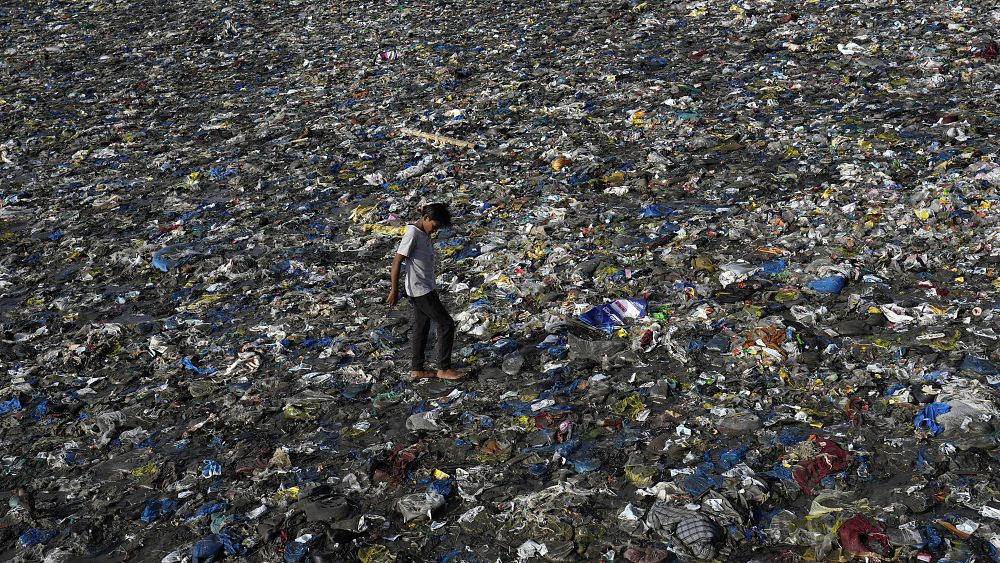
Today marks International Plastic Overshoot Day, when the world officially exceeds the amount of plastic it can effectively manage in a year.
For the first time, the day is being marked internationally by Swiss-based research consultancy Earth Action.
“Raising awareness is one of the goals, but empowerment and actionability are arguably even more important,” Sarah Perreard, co-CEO and stakeholder engagement lead at Earth Action, told Euronews Green.
“We don’t want to just educate people about this issue, we want the data and insights in our comprehensive report to act as a tool to drive forward the necessary changes needed.”
There is a Plastic Overshoot Day for every country, every year
International Plastic Day aims to raise awareness of the world’s harmful relationship with plastic and our struggles to adequately recycle it.
28 July is significant because it averages out every country in the world’s plastic management progress, calculating how much plastic they recycle compared with how much is ‘wasted’ or dumped.
Some are able to process much more plastic than others.
Denmark’s ‘overshoot day’ is 26 December because it is good at managing plastic waste. There are only four days where plastic is wasted in relation to the nation’s capacity to recycle it.
Nigeria’s ‘offshoot day’ is 3 January, meaning that for the rest of the year, plastic is simply not recycled or managed and will often be dumped into the environment.
The world is facing a plastic problem: What does this mean?
Currently, according to Earth Action, 43 per cent of all plastic waste generated is mismanaged. That’s the equivalent of more than 68.5 million tonnes of plastic this year alone. This includes 420,000 tonnes of chemical additives released into waterways.
Over 40 per cent of the world’s population has, since 8 January 2023, been living in areas where the amount of plastic waste generated has already exceeded the capacity to manage it.
Plastics are not only damaging to the environment but to living creatures as well.
Macroplastic, anything larger than 5mm, can cause entanglement, injuries, and ingestion in animals. While microplastics, less than 5mm in size, have been linked to carcinogenic effects, liver dysfunction, and endocrine disruption – especially if they contain hazardous substances.
The production of plastics doesn’t seem to be slowing down either, with more than half of all the plastics that have ever been made dating from 2000. Global plastic production is estimated to continue to grow fast, reaching more than 1 billion tonnes by 2050.
Why are developing countries struggling to process plastic?
Many of the highest plastic waste producers in the world are from the Global South – partly because they are also having to take in and process the waste of richer countries.
“Billions of people live without adequate waste management systems and plastic pollution is very evident in some parts of the world,” Dr Tobias Nielsen, a researcher on climate and sustainability politics at the Swedish Environment Research Institute, explains.
“Yet, it is not only the national government but also the companies operating in these countries that have a responsibility to develop plastic waste management. The EU can also help in developing waste management systems and of course by ensuring that EU plastic waste does not end up in developing countries.”
The United Nations is now seeking to agree on a treaty on plastic pollution to eliminate waste pollution and waste on a global scale.
THE ROTTEN FISH: CAN OF WORMS OPENED OF APC & TINUBU'S GOVERNMENT OVER NIGERIA'S ECONOMIC DOWNTURN
WATCH THE CRITICAL ANALYSIS AND KNOW THE RESPONSIBLE PARTIES TO BLAME FOR NIGERIA'S ECONOMIC CHALLENGES, WHILE CITIZENS ENDURE SEVERE HARDSHIPS.Watch this episode of ISSUES IN THE NEWS on 9News Nigeria featuring Peter Obi's Special Adviser, Dr Katch Ononuju, 9News Nigeria Publisher, Obinna Ejianya and Tinubu Support Group Leader, McHezekiah Eherechi
The economic crisis and hardship in Nigeria are parts of the discussion.
Watch, leave your comments, and share to create more awareness on this issue.
#9NewsNigeria #Nigeria #issuesInTheNews #politics #tinubu THE ROTTEN FISH: CAN OF WORMS OPENED ...
DON'T FORGET TO SUBSCRIBE AND LEAVE YOUR COMMENTS FOR SUBSEQUENT UPDATES
#9newsnigeria #economia #economy #nigeria #government @9newsng
www.9newsng.com
